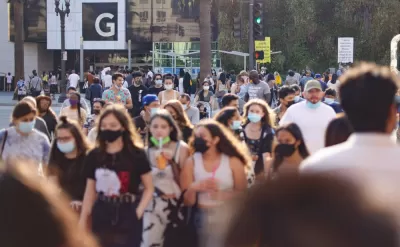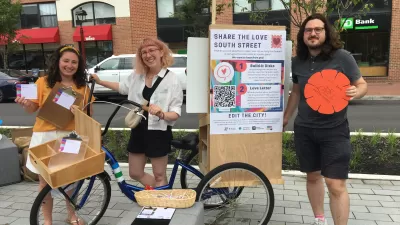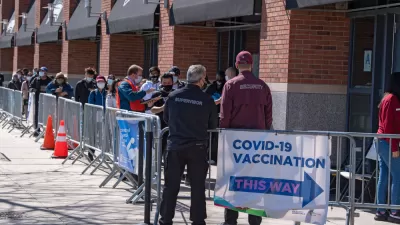Although the survey collects data from a small sample, it looks like North American planners don't expect the pandemic to change much about the way cities are planned.

A recent survey indicates that planners don't intend to change much in their approach to urban planning, despite the various disruptions and influences of the Covid-19 pandemic.
Researchers at the University of Waterloo in Canada surveyed 98 city planners (after disseminating the survey via the Canadian Institute of Planners Newsletter, the American Planning Association's Interact newsletter, and various planning-related social media groups) about the future of planning in mid-sized urban areas as a response to the Covid-19 pandemic, publishing the results in the Planning Practice & Research journal (the study is currently available in full online) in December.
"Despite calls for greater creativity and innovation, there is essentially no difference between what planners viewed as more important to downtowns pre-and-post the pandemic," says Pierre Filion, an emeritus professor in the School of Planning at Waterloo, as quoted in an article by David Malone for Building Design + Construction that shared news of the new research.
Like the public and the media, the surveyed planners are certainly aware of the negative effects of the pandemic. Among the study respondents, 60% "indicated that the pandemic had a substantial negative effect on downtowns," according to the study. "The survey respondents perceived that the most severe effects of the pandemic were experienced by eating and drinking establishments, with substantial negative effects being reported by more than 75% of the respondents."
Yet, the survey did not reveal that planners expect to produce a commensurate response in the form of reform and innovation. From the discussion of the journal article:
The survey findings reveal a disconnect regarding planner’s perceptions of the drivers of downtown recovery after Covid. On the one hand, despite calls for greater creativity and innovation, there are essentially no differences between what planners viewed as important to downtowns pre-and-post the pandemic. This suggests that they are not ‘planning’ on fundamental changes to past practice even in the face of a changing reality, or a ‘new normal.’
The full Planning Practice & Research article can be found at the link below.
FULL STORY: Planning for Post-pandemic Downtowns of Mid-size Urban Areas

Trump Administration Could Effectively End Housing Voucher Program
Federal officials are eyeing major cuts to the Section 8 program that helps millions of low-income households pay rent.

Planetizen Federal Action Tracker
A weekly monitor of how Trump’s orders and actions are impacting planners and planning in America.

Ken Jennings Launches Transit Web Series
The Jeopardy champ wants you to ride public transit.

Washington Legislature Passes Rent Increase Cap
A bill that caps rent increases at 7 percent plus inflation is headed to the governor’s desk.

From Planning to Action: How LA County Is Rethinking Climate Resilience
Chief Sustainability Officer Rita Kampalath outlines the County’s shift from planning to implementation in its climate resilience efforts, emphasizing cross-departmental coordination, updated recovery strategies, and the need for flexible funding.

New Mexico Aging Department Commits to Helping Seniors Age ‘In Place’ and ‘Autonomously’ in New Draft Plan
As New Mexico’s population of seniors continues to grow, the state’s aging department is proposing expanded initiatives to help seniors maintain their autonomy while also supporting family caregivers.
Urban Design for Planners 1: Software Tools
This six-course series explores essential urban design concepts using open source software and equips planners with the tools they need to participate fully in the urban design process.
Planning for Universal Design
Learn the tools for implementing Universal Design in planning regulations.
Heyer Gruel & Associates PA
Ada County Highway District
Institute for Housing and Urban Development Studies (IHS)
City of Grandview
Harvard GSD Executive Education
Toledo-Lucas County Plan Commissions
Salt Lake City
NYU Wagner Graduate School of Public Service





























